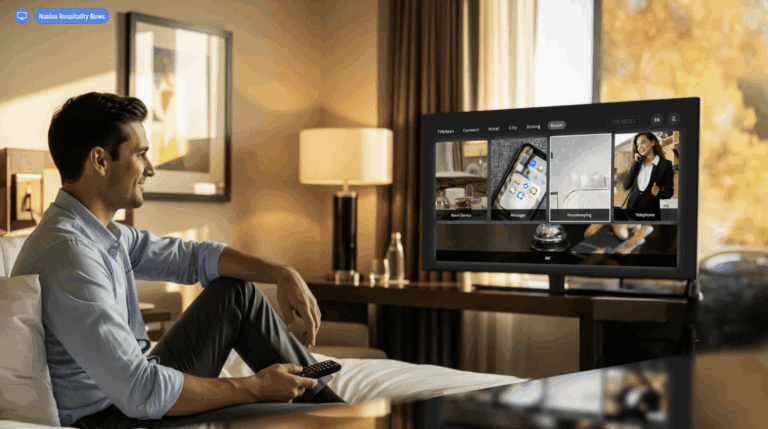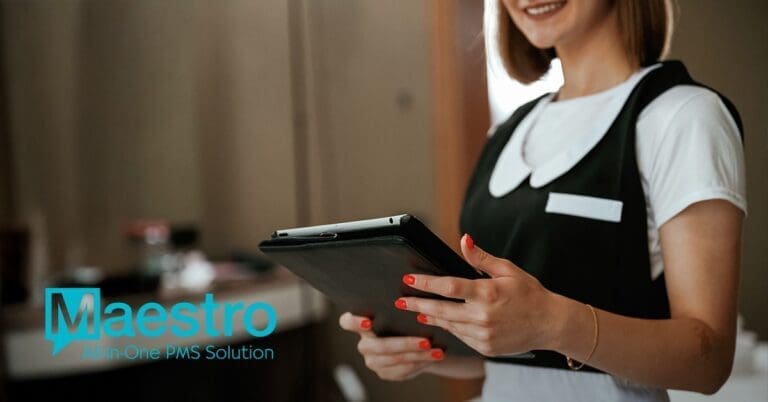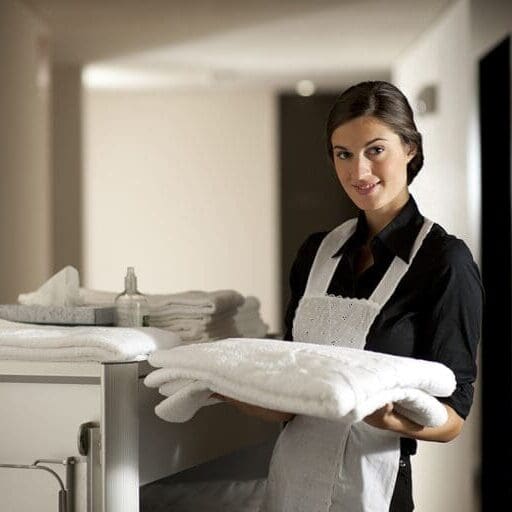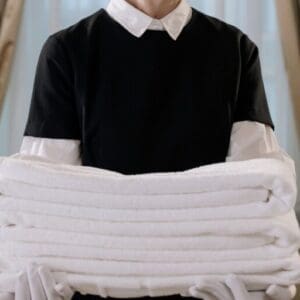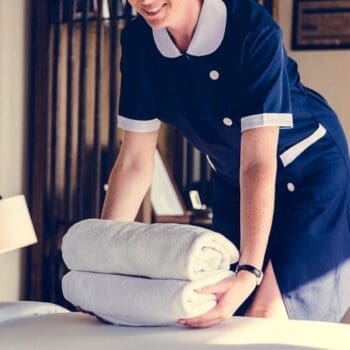
What a way to start 2024…by digging up the now classic hotel ops debate of to clean or not to clean. By the title, it should be clear where we stand (especially for upscale or luxury hotels). Nevertheless, with labor issues omnipresent for hospitality – both supply and cost – this will always be an issue to decide.
Are you considering changing your brand standards to only offer daily housekeeping on demand or for an extra fee? It’s a big question with lots of contributing variables. This article is not meant to be a polemic against the global industry shift away from offering daily housekeeping, but more of a ‘buyer beware’ in that there is a profound loss to the overall hotel experience that will result, regardless of any post-pandemic or generational changes in customer expectations.
In today’s climate of spasmodic, and market-specific, labor shortages, we have heard many arguments that go against daily housekeeping as well as meaningful discussions in favor of cleaning only a check-out basis. The three strongest ones are:
- Eliminating stayover cleans or offering them only by request is the only way to contend with current labor conditions, both insofar as staffing challenges and inflationary costs.
- Whether it’s due to the rising number of Gen Y+Z customers, business travelers who barely use the room or people still weary over viral spread, hotel guests on average just don’t value daily cleaning, or even turndown service, with certain categories like luxury and resort properties as exceptions.
- To a lesser extent, technology has now caught up whereby opting in for daily cleaning can be both automated on the individual room cleaning assignment level and, potentially, upsold with frictionless updates to the guest folio.
Penny wise pound foolish?
This discourse is largely happening as a by-product of the Covid era, as many of guests still fear that having a housekeeper in their suite who may leave behind some sort of viral residue, despite all the work that cleaning product suppliers have done to upgrade their sanitization solutions and to ramp up general awareness. Our opinion is that, while there are still some guests who will be forever triggered by the mere thought of COVID-19, the concern is gone. It’s 2024; the world wants to travel as unencountered as is physically possible.
As for trying to mitigate the rising costs of doing business, this is where we see problems in a ‘penny wise, pound foolish’ sort of way. Despite the work that alternative accommodation providers like Airbnb have done to change the general perception about this service, we firmly believe that daily housekeeping is a core differentiator for traditional hotel products.
Hotels are in the hospitality business, and yet increasingly it’s the accountants who are running the show, using metrics that may not wholly account for the gamut of emotions of each guest as they traverse the grounds from check-in to check-out. While we respect the enticement of reduced costs through cutting the most expensive and labor-intensive department, this is the very foundation of our business that is being questioned.
Think deeply about this question: what separates a room for rent from a hotel guestroom? While the answer may differ for brands at the select service and economy spectrum, our belief is that, once we give up housekeeping, we’ve thrown in the proverbial towel (pun intended).
Over the long run, if you remove housekeeping then what is your brand promise? For example, if a mid-tier brand no longer offers daily housekeeping, then what other core services will they have to keep guests loyal besides points?
The eyes and ears of the hotel
Mark our words: housekeeping is vital to our industry. Firstly, room attendants are a key touchpoint with the guest. They are our eyes and ears on the guestroom floors. By getting into every room every day, they protect our asset and also help us to protect the guest. Good housekeepers identify maintenance issues when they are minor – say, a leaky faucet – and summon an engineer before the issue becomes more serious (possibly to the point where the room needs to be taken out of service, thereby impacting revenues).
By their visibility alone, it is near impossible for a guest to create an act of malfeasance that would harm the property, themselves or other guests. And indeed, there are a few very significant and unspeakable examples of this. On this note, we also wonder if there is a fiduciary responsibility by the innkeeper to protect their guests’ welfare through regular inspection. Not being legal experts, we’ll set this one aside.
Secondly, there are now several brands that entice guests to forgo housekeeping in return for increased loyalty point accumulation. On an apples-to-apples comparison, this looks good; it promotes more onsite amenity utilization in the way that the guest wants. But we ask: who ultimately pays for these points? When you factor in all the knock-on effects and hidden costs, the burden falls on the individual property.
The hidden costs of foregoing daily cleans
Sometimes costs are counterintuitive. You would think that sunsetting stayover cleans would be a great and universal cost saver for hotels in the midscale and premium categories. But oftentimes (and as we have verified firsthand with ops teams when conducting a property evaluation for a client), the lack of daily touch-ups to the room results in sizeable cost overruns and time pressure for check-out cleans.
These overruns, as measured by extra minutes per room, can lead to an inability to turn all the rooms around in time for resale that same day. The end result is you can’t max out occupancy on certain days of the week.
This change of events harks at the core of the cost-efficiency problem. Big brands may be shooting themselves in the foot with their scrupulous cost-cutting ventures. On paper, they are saving on wages, but a deeper analysis may reveal that the benefit to gross revenue optimization outweighs increased costs of wages as well as reducing housekeeper turnover by providing better job security through more hours each week.
Ultimately, and this is still our opinion, the death of daily housekeeping will spell the death of brand differentiation. When this happens, you may as well convert every mid-tier property into select service then just have an Al engine choose the nightly rates according to demand indicators, with only a skeleton crew onsite and regional management to optimize GOPPAR.
A hotel world without housekeeping is not the industry that hoteliers have entered, at least not in a traditional sense. Even though times are changing, we must nevertheless decide what are the immutable parts of the hotel experience. Review our arguments and prove us wrong about daily housekeeping being one of those parts.
This article may not be reproduced without the expressed permission of the authors.



